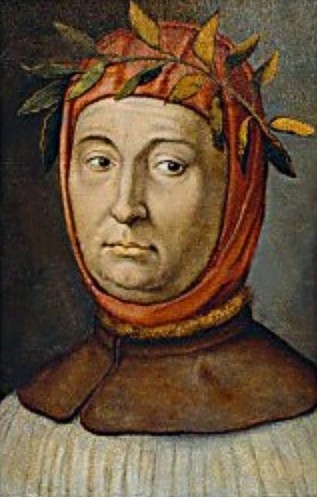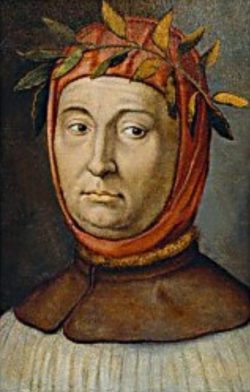This week we will be reading from the works of Petrarch. Petrarch (Or Francesco Petrarca), was an Italian poet and scholar of the early Renaissance. He is considered the father of Humanism, the person who coined the term The Dark Ages, and one of the first tourists (he loved to travel for the sake of travel, and wrote extensively about it) He is also considered one of the great love poets of the world. He wrote in the 1300’s, 250 years before Shakespeare, and his sonnets are very different in both rhyme scheme and form than Shakespeare’s. He also wrote in Italian. Find out more about Petrarch.
Today’s episode I will be reading the poem twice– the first in a translation by T.W. Higginson, in a turn of the century (1900) translation, and then a more recent translation by Chris DiMatteo, a fellow that I found on the Internet and who graciously allowed me to read his work. You can find him on the Internet at http://www.cdimatteo.com. It’s interesting to see how different the translations are, and how that translates into reading it aloud.
Here’s the poem in the original Italian:

Voi ch’ascoltate in rime sparse il suono
di quei sospiri ond’io nudriva ‘l core
in sul mio primo giovenile errore
quand’era in parte altr’uom da quel ch’i’ sono,
del vario stile in ch’io piango et ragiono
fra le vane speranze e ‘l van dolore,
ove sia chi per prova intenda amore,
spero trovar pietà, nonché perdono.
Ma ben veggio or sí come al popol tutto
favola fui gran tempo, onde sovente
di me mesdesmo meco mi vergogno;
et del mio vaneggiar vergogna è ‘l frutto,
e ‘l pentersi, e ‘l conoscer chiaramente
che quanto piace al mondo è breve sogno.

And here’s Higginson’s translation:
O ye who trace through scattered verse the sound
Of those long sighs wherewith I fed my heart
Amid youth’s errors, when in greater part
That man unlike this present man was found;
For the mixed strain which here I do compound
Of empty hopes and pains that vainly start,
Whatever soul hath truly felt love’s smart,
With pity and with pardon will abound.
But now I see full well how long I earned
All men’s reproof; and oftentimes my soul
Lies crushed by its own grief; and it doth seem
For such misdeed shame is the fruitage whole,
And wild repentance and the knowledge learned
That worldly joy is still a short, short dream.
And here’s DiMatteo’s translation: (see his website)
l Canzoniere, Sonnet n. 1
Translation © Chris DiMatteo 2017. All rights reserved.
To you who hear the sound, in scattered rhymes,
of all my sighs with which I fed my heart,
there was my early youthful heart’s mistake,
I was in part a different man than now,
Of all my different cries and wondering,
among my hopeless pain and hopeless wishes
wherever people know from living love,
I hope to find their pity and their pardon.
But now I know that all the people are
for quite a while laughing at my folly
and I do feel that shame inside myself;
My vanity has grown the fruits of shame
and my repentance, as I clearly know
that what we love of life is but a dream.
Translator’s note to n. 1:
In this translation, I found that the English version came to me in a meter different than that of the original; it is in a kind of iambic pentameter but with an extra syllable here and there.
